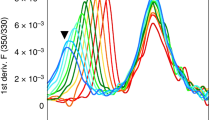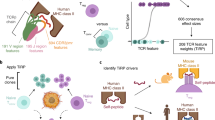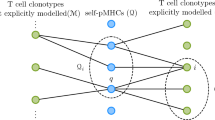Abstract
T lymphocytes require a foreign antigen to be presented on a cell surface in association with a self-transplantation antigen before they can recognize it effectively. This phenomenon is known as major histocompatibility complex (MHC) restriction1. It is not clear how an incalculably large number of foreign proteins form unique complexes with a very limited number of MHC molecules. We studied the recognition properties of T cells specific for a peptide derived from bacteriophage A cl protein. Analogues of this peptide, as well as peptides derived from other unrelated antigens which can be presented in the context of the same MHC molecule, can competitively inhibit activation of these T cells by the cl peptide. Furthermore, these unrelated antigens can stimulate cl-specific T cells if certain specific amino-acid residues are replaced. Here we suggest a model in which all antigens give rise to peptides that can bind to the same site on the MHC molecule. T-cell recognition of this site (which is presumed to be polymorphic) with or without antigen bound can explain self-selection in the thymus and MHC restriction.
This is a preview of subscription content, access via your institution
Access options
Subscribe to this journal
Receive 51 print issues and online access
$199.00 per year
only $3.90 per issue
Buy this article
- Purchase on Springer Link
- Instant access to full article PDF
Prices may be subject to local taxes which are calculated during checkout
Similar content being viewed by others
References
Schwartz, R. H. A. Rev. Immun. 3, 237–261 (1985).
Rock, K. L. & Benacerraf, B. J. exp. Med. 157, 1618–1634 (1983).
Werdelin, O. J. Immun. 129, 1883–1891 (1982).
Shimonkevitz, R., Colon, S., Kappler, J. W., Marrack, P. & Grey, H. M. J. Immun. 133, 2067–2074 (1984).
Babbitt, B. P., Allen, P. M., Matsueda, G., Haber, E. & Unanue, E. R. Nature 317, 359–360 (1985).
Watts, T. H., Gaub, H. E. & McConnell, H. M. Nature 320, 179–181 (1986).
Ashwell, S. D. & Schwartz, R. H. Nature 320, 176–179 (1986).
Finnegan, A. et al. J. exp. Med. 164, 899–910 (1986).
Watts, T. H., Gariepy, J., Schoolnick, G. K. & McConnell, H. M. Proc. natn. Acad. Sci. U.S.A. 82, 5480–5484 (1985).
Guillet, J.-G. et al. Proc. nain. Acad. Sci. U.S.A. (submitted).
Delisi, C. & Berzofsky, J. A. Proc. natn. Acad. Sci. U.S.A. 82, 7048–7052 (1985).
Townsend, A. R. M. et al. Cell 44, 959–968 (1986).
Sauer, R. T. & Anderegg, R. Biochemistry 17, 1092–1100 (1978)
Merrifield, R. B. J. Am. ehem. Soc. 85, 2149–2154 (1963).
Author information
Authors and Affiliations
Rights and permissions
About this article
Cite this article
Guillet, JG., Lai, MZ., Briner, T. et al. Interaction of peptide antigens and class II major histocompatibility complex antigens. Nature 324, 260–262 (1986). https://doi.org/10.1038/324260a0
Received:
Accepted:
Issue Date:
DOI: https://doi.org/10.1038/324260a0
This article is cited by
-
Divergent paths for the selection of immunodominant epitopes from distinct antigenic sources
Nature Communications (2014)
-
Recombinant vaccines against ovine footrot
Immunology & Cell Biology (1993)
-
Isolation of an endogenously processed immunodominant viral peptide from the class I H–2Kb molecule
Nature (1990)
-
Immunological activity of covalently linked T-cell epitopes
Nature (1990)
-
Mapping T cell receptor epitopes on the Aβ polypeptide
Immunologic Research (1990)
Comments
By submitting a comment you agree to abide by our Terms and Community Guidelines. If you find something abusive or that does not comply with our terms or guidelines please flag it as inappropriate.



